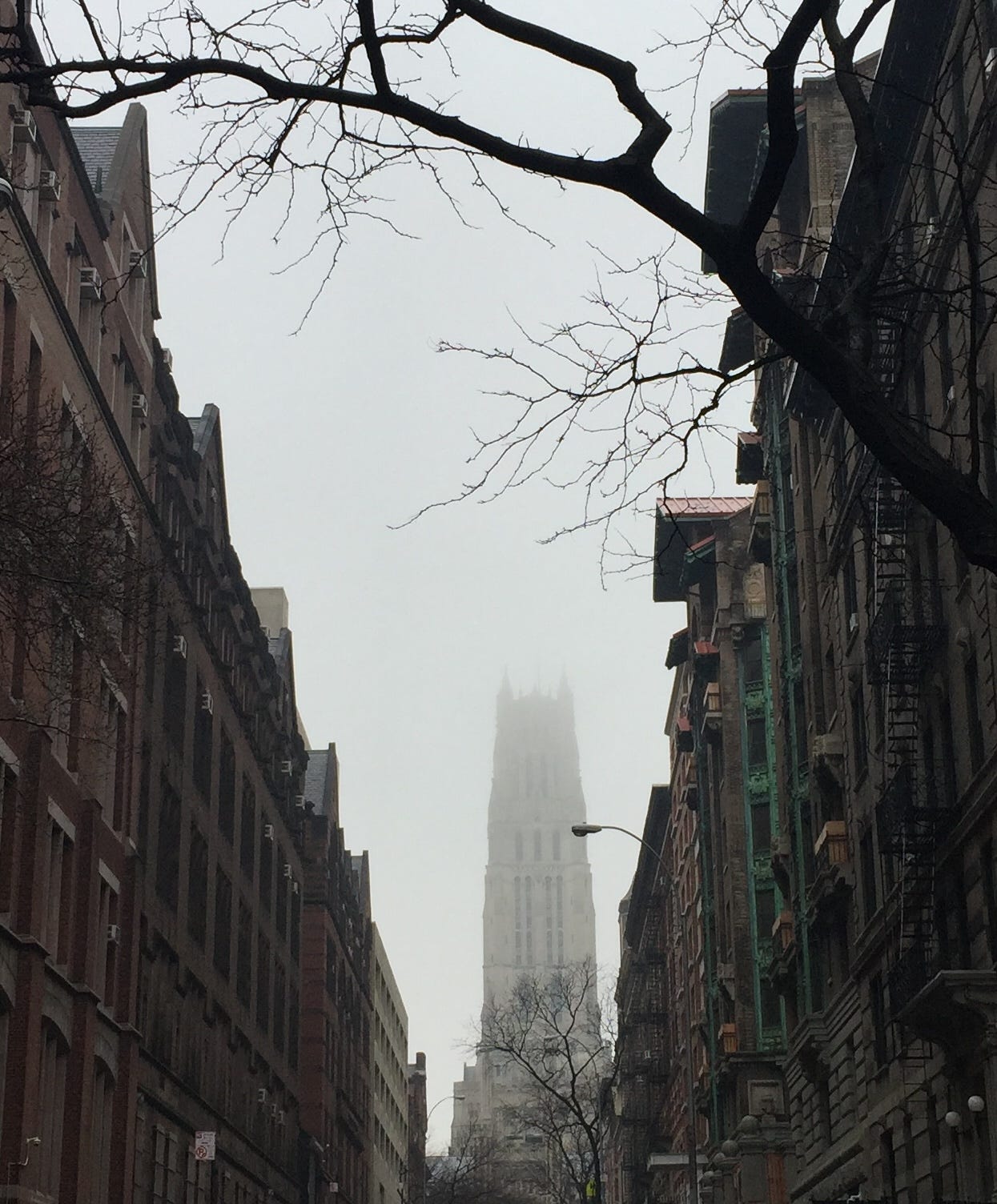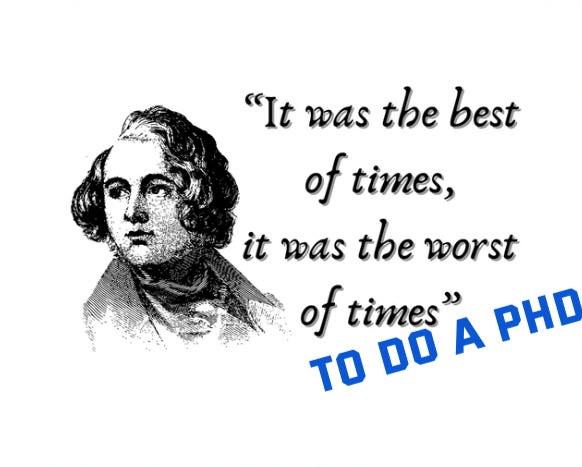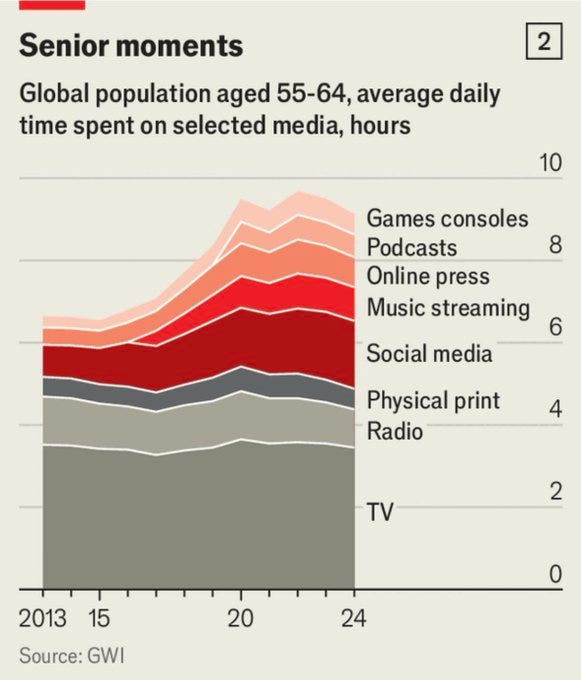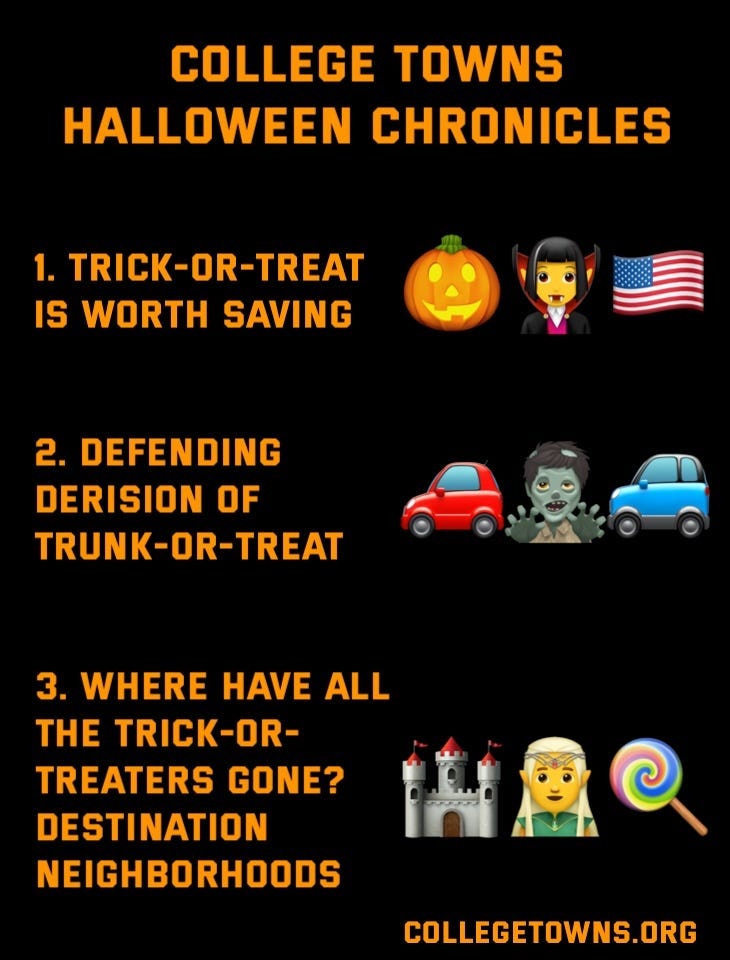Best of Times or Worst of Times to do a PhD, Substack Halloween, & More
Around the College Towns: Links and commentary related to urbanism and higher ed for the week of Oct. 26 - Nov. 2.
Note: Around the College Town is my weekly links roundup article on urbanism and education. These posts mostly cover news that may have fallen through the cracks rather than the big events. I am experimenting with new posting times for these, hence this one on Monday.
I have been critical of doing a PhD here on College Towns, citing examples like the ‘Homeless Professor’ or endless grad school. The topic has become more salient in recent weeks with reports of Harvard cutting various doctoral admissions. These actions, along with other broader cuts in the sector, prompted a conversation around PhDs. In particular, should you do one or not?
Fellow Substacker Paul Musgrave is firmly in the not camp. He recently wrote in Slate that we were in the “Dark Ages” for PhD in the US. He cites the cuts to grants and research funding, but also the realities that are the higher education sector and beyond.
For those who get through the hunger games of admission, the actual experience is likely to be more unpleasant than for previous generations. Austere university budgets will lead administrators to continue to look hard at cost centers like doctoral education… Students who brave that gantlet and emerge with a Ph.D. (which is far from all of them) will then have the privilege of competing for scarce faculty jobs.
Musgrave, who is a faculty member at Georgetown University in Qatar, also (rightly) pointed out that the massive endowments listed at these top R1s cannot bail out these programs and have considerable restrictions. Admittedly, last week I was poking fun at Harvard’s endowment growth at the same time as its austerity.
Conversely, The Chronicle of Higher Ed published an op-ed from another professor, Ada Palmer of the University of Chicago, who argued this was actually a great time to do a PhD. Her main argument was that given all the uncertainty in the job market and tech sectors, taking a few years from right now just to think and learn is a good plan.
The Ph.D. process teaches broad expertise in research methods. Doctorate holders know how to evaluate evidence, chase down sources, verify claims. They learn methods for finding reliable information, when to be suspicious of data, and how to act upon those suspicions. In addition to learning what we know, a Ph.D. student gains expertise in what we don’t know, learning where the frontiers in a field are, the big questions, incompleteness, and areas a field has not yet tackled. Someone with a Ph.D. can often look at a graph and say, not “that isn’t true,” but “that data doesn’t exist.”
Given these skills that PhDs gain during their studies, Palmer is especially animated that these translate to highly sought-after careers. She cites Nokia as hiring a high number of grad degree holders in recent years. Broadly, PhDs will be invaluable experts in a world that has become more anti-science but also on the cusp of technological revolution.
Finally, Maddalena Alvi, also writing in The Chronicle, argued that the pauses in PhD admissions by Harvard and other universities are actually a “blessing” for the sector. Alvi, a recent PhD graduate from the University of Cambridge, cited similar terrible job numbers as Musgrave’s Dark Age article.
She also responded directly to Palmer’s pro-PhD piece.
At the cost of sounding cynical, I don’t see why anyone would voluntarily embark on a highly specialized and restrictive training — one designed as a vocational prerequisite — just to develop deep skills. Palmer is right when she says that there will always be some demand to employ the holders of doctorates, but she neglects the real question: How high will that demand actually be? There is already an oversupply of Ph.D.s in many fields, and the positions that are available often come with low pay and lack of job security… While hard work once led to a permanent position, it now fast-tracks doctoral students into un- or underemployment.
Further, rather than seeing the coming technological revolution from AI or other automations as a gift for PhD holders, she views what is coming (or is already here) as an onslaught against opportunity. After years and years of study and fine-tuned research, graduates will find themselves automated out of what little opportunity such fields had left.
So what is my verdict?
I give this round to the Musgrave and Alvi. Sorry, Palmer. It is not, unfortunately, a good time to do a PhD.
I do appreciate the positive outlook on life coming from the pro-PhD take. Yes, in a perfect world, going and hanging out for five years to learn, think, and write on some very esoteric topic is likely good for the human soul. We should aspire to this as a society, giving more people such opportunities.
Instead, there have been more cuts and fewer such possibilities coming out of 5-7 year hiatus. I actually do not think every decision about education needs to be rooted in job or work, especially for younger students still finding their way in life. But taking time like this well into your 30s or 40s bumps into the the realities of life.
So I am skeptical of doing a PhD right now. I wish things were different. But it is just true that things are getting worse. Students should at least know these things before they consider a PhD.
Links I’m Reading This Week
Education
The first college to sign Trump’s Higher Ed Compact is New College of Florida, which is no surprise since the institution has been remade by the GOP government in recent years. Of note, New College only has about 5% international students.
An affluent New Jersey town cannot afford to fund its schools. Montclair is home to celebrities and wealthy Manhattan commuters, so the struggling public schools may surprise some. But it is related to all the wealthy parents putting their kids in private schools. No local buy-in for publics.
Pablo Torre, who has been making waves with his investigative journalism into various sports stories, has a deep dive into an employee of the University of North Carolina. After listening to the deep dive, it seems the state taxpayers are getting ripped off with Michael Lombardi’s $1.5 million yearly salary.
Speaking of college football, an athletic director has been fired after his last two hires had to be fired, costing his schools over $100 million in contract buy-outs. First Texas A&M and now at LSU. Wild how much one guy can cost higher ed.
Graduates of liberal arts colleges are more likely to go to graduate school, delaying initial earnings but boosting them later. (Although, I should add it looks like parental income is a big factor here).
Urbanism-ish
Renters in Hong Kong can get deals on apartments if they are willing to live with ghosts. That’s right, in one of the most expensive real estate markets in the world, there are discounts for haunted houses.
In a headline that seems more about California, Japan’s new maglev bullet train has been delayed until 2035 under ballooning costs.
To escape the wild housing prices in California, one couple built a $500K ADU in their parents’ backyard. This kind of thing seems strange but it should be more common (and used to be!). My only critique is that it should be the retiring boomers moving into a smaller ADU and the younger couple staying in the main house. Nitpicks!
New data suggests that seniors are more addicted to their smartphones than young people. I can see that since they have fewer things going on and stay out home more. I might write more about this trend in the future.
Speaking of social media, Chinese President Xi Jinping reportedly calls TikTok “spiritual opium.” What symbolism there! I will have to write more on this in the future.
Japanese McDonald’s will no longer be using paper straws. We have mostly gotten rid of them here, but I just had to note how terrible this trend was.
A Waymo ran over a street cat in San Francisco, killing it. RIP. The neighborhood was devastated, and the company pledged a donation in support. This brings up some really interesting ethical issues of self-driving cars that I hadn’t thought of yet. I need to think more about this.
Others are noting that the new Grokopedia is bad. As I noted a couple weeks ago, this is not a replacement for Wikipedia, at least I hope not.
Around Substack on Halloween
Note: I also think it’s important to stay connected to the growing Substack community. Here are a few I am reading this week, which all have Halloween themes:
Ryan Puzycki, at the greatly named City of Yes Substack, had a spooky article this week about the urbanism (essentially) of graveyards. While it may seem Halloween-themed, the issue of burial and remains is something cities must grapple with all year-round.
Across the Atlantic, Mount Auburn Cemetery outside Boston pioneered the American version of the park-like necropolis with a landscaped cemetery that doubled as a botanical garden. Mount Auburn inspired copycats from Oakland in Atlanta to Laurel Hill in Philadelphia, birthing a national public parks movement. In New York City, officials had outlawed all burials south of 86th Street by 1851, prompting the creation of the so-called Cemetery Belt in Brooklyn and Queens, then at the edges of an expanding city and where many of Manhattan’s corpses would find their final final-resting places.
What a fascinating, if not morbid, history!
In even more history dealing directly with the holiday, Andrew Hunt at Postwar Pop does a deep dive into the midcentury traditions that morphed into the holiday that we all grew up to love.
After World War II, with the United States entering a new era of prosperity and consumerism, even the ancient celebration of Halloween underwent a striking transformation. The period from 1945 to the 1970s saw the emergence of what we might call “modern” Halloween, which was a far cry from the horrifying disguises and raucous, sometimes downright destructive celebrations that characterized the event in earlier generations.
Gone were the unsettling costumes that predated the Second World War, replaced by mass-produced outfits that helped make the holiday more accessible and less frightening for children. Thankfully, the rampant vandalism and acts of destruction so common to earlier Halloweens of yore gave way to saner, less harmful celebrations.
I think it goes to show how much the Boomer experience has impacted the conception of American life and Americanness broadly. What developed as childhood and typical life in the 1950s was reflected in how we thought about growing up in the 1980s and 1990s. Even now, we are still chasing those ghosts.
Jenna Woginrich at Cold Antler Farm has a fun (and grumpy) take on the changes happening to Halloween. She fondly reminisces about the old trick-or-treat holiday that was definitive to Millennial suburban childhood. These memories inspire my own writing on the topic.
And perhaps my biggest issue, my reason for shaking a cane at modern horror and Halloween fans. Halloween used to be wholesome. It really was about making the day special for kids, and not just your own kids, but for ALL kids…
People went out of their way to delight the children of strangers, to make their house the one kids gushed about at recess the next day. And it wasn’t just trick or treat night either. Spooky season was a time when the library had scary story hour. When the school had a costume parade through town. When scouting troops had daylight parties to bob for apples and make red cellophane covers for flashlights to hand out at school.
Now most Halloween events are 18+
Indeed, this age change in the focus of Halloween is something that I have noticed. It is also a critique I have gotten as a missing piece to some of my writing on the holiday. I can say now, I will grapple with the topic directly in next year’s annual Halloween post.
Closing Time… Congrats to the Dodgers
The LA Dodgers just won their second World Series after an amazing series with the Toronto Blue Jays. It went the full 7 games and even into extra innings to close out the series. It was a legendary World Series that will live on for a long time.
I apologize to my Canadian readers! That was such a heartbreaking way to lose. I am sorry.
It is the second championship in a row for the Dodgers, who have a superteam led by real-life Japanese superhero Shohei Ohtani. I was lucky enough to attend the celebration parade last year in downtown LA, but this year I cannot make the scheduled Monday event.
You can read my account of last year’s parade and celebration below. It was the first time I felt like LA was a real city. I could really see the potential of the city then. Enjoy!









Thank you very much for discussing my op-ed in the Chronicle!
Maddalena
Thank you for the mention!